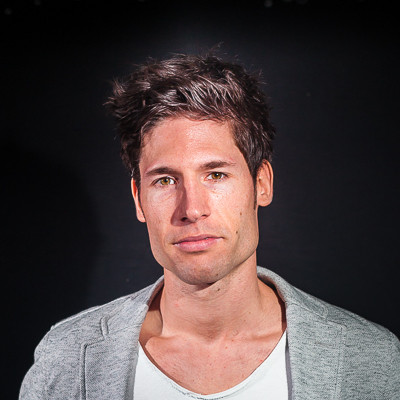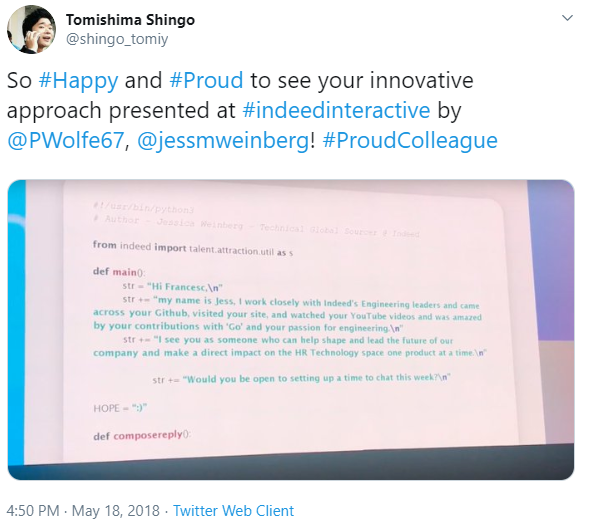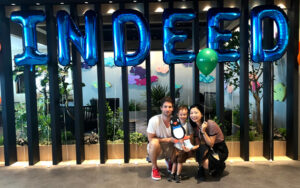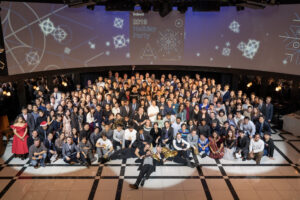 Sebastian Tschan was a CTO in a small Swiss/German startup when an unexpected email written in code from Indeed sparked the fires for a new life across the world. Find out more about the journey that brought him to Indeed, and what life is like for him and his family now in Tokyo.
Sebastian Tschan was a CTO in a small Swiss/German startup when an unexpected email written in code from Indeed sparked the fires for a new life across the world. Find out more about the journey that brought him to Indeed, and what life is like for him and his family now in Tokyo.
Like other engineers, I sometimes receive emails from recruiters, but when I received Shingo Tomishima’s email on October 4, 2018, it was a bit different.
It looked a bit like this:

An email written as code intrigued me and although Indeed wasn’t really on my radar as a future employer, I knew them as a product myself, as some job seekers had found my company on Indeed.
At that time, I was working as a Chief Technology Officer for a small startup in Germany. A large part of my role was hiring. I had grown the engineering team from three to 20 members in four years.
Indeed is all about matching job seekers with employers and because that was such a large part of my job, it made me curious. It was also really good timing, since my wife and I had already considered a move to Japan. Although Indeed’s headquarters are in Austin, Texas, they have offices all over the world and a large group of engineers are located in Tokyo, Japan.
The Arrival
On 1 May 2019, my wife, our 3-year-old son and I arrived in Tokyo with just our suitcases. A dozen boxes with the rest of our stuff arrived soon after. We were provided with temporary accommodation in central Tokyo and had a month to find our own apartment. Indeed’s global mobility team was super friendly and helpful, making the move from Germany to Japan so much easier.
Just a week after we arrived, I went to Indeed’s Tamachi office, which had just opened a month prior, to start my new job.

At Indeed, new engineering recruits do something called an Individual Contributor Rotation. So although I was hired as an Engineering Manager, from May to June I would work as a Software Engineer, committing code to Indeed’s various repositories.
I’m glad I had the opportunity to do this, as it provided me a good understanding of the tasks and issues engineers face in their daily work and helped me to become familiar with Indeed’s technology, processes and tools through hands-on experience.
Unfortunately, despite a very welcoming environment, I was not happy at the beginning.
A Rocky Start
Part of this had nothing to do with Indeed and was just the process of getting used to Tokyo. Although I used to live in other bigger cities, like Osaka, Aguascalientes (Mexico) and London, I’m originally from a rather small town close to Freiburg, Germany and prefer nature over city life.
But I was also a bit frustrated about the technology stack at Indeed, as I was not used to multi-minute build times, deployment pipelines that were configured via multiple config files, JIRA labels and a lot of internal knowledge, nor the ubiquity of Java and the Spring Framework.
When I was in University, I was very fond of Java, and even helped other students learn the language as a tutor for two semesters. I had also used it to implement the backend for a final study project that integrated motion capture data with a virtual 3D environment.
But in over a decade of my professional life, I had never touched it again – until I joined Indeed.
Here, Java is everywhere and although there are roles that primarily use other languages, like Python for data scientists, Go for internal platform teams and JavaScript/TypeScript for front-end developers, most software engineers will write Java code in their daily work.
So I had to brush up my rusty Java skills and accept that, for once, I was not the domain expert anymore. In fact, I felt very much like a beginner again and all the acronyms and code names for internally developed technology at Indeed didn’t make things easier.
But slowly, over time, I became familiar with how things work here and also came to appreciate all the good things at this company.
My favorite thing by far is Indeed’s mission statement: “We help people get jobs”.
I’m glad to be able to work on something that has a positive impact on people’s lives and from everything I’ve learned in the past months, so do the people around me.
A Company that is Mission Driven
I think the reason this particular mission works is that helping job seekers find the right jobs directly benefits employers, creating more value for the money they spend on our platform, which creates revenue for us.
To achieve the stated mission, Indeed invests into user research and runs a myriad of experiments to find out which improvements and new features actually do help. This data-driven approach is embraced across the company and supported well with tooling, some of which has even been made open source (https://github.com/indeedeng).

Although I still have gripes with the state of Software Development at Indeed, I think deploying and analyzing A/B-Tests works very well.
Evidence-based practices also extend beyond product development. A lot of effort goes into making bonus payouts and promotions as fair and bias-free as possible, and individuals note down their contributions across products and organizations and link it with evidence.
This gets reviewed by a panel of managers against a set of expectations for their level, with a more behavior-focused view for promotions.
While I don’t think the system is perfect (opportunity and visibility are still important factors), it is much less dependent on individual managers making the right decisions.
The lived mission of helping people get jobs, the approach to product experimentation, and career advancement are all great aspects of working for Indeed, no matter if you join in Japan or the US.
But something that makes the location in Tokyo special is that 70% of our employees are expats, and both the expats and many of our Japanese co-workers have an active interest in foreign cultures and prefer to work in a diverse work environment.
In my experience, this creates a greater sense of community, which is visible in the amount of shared after-work activities.
Personally, I’ve played futsal, basketball, table tennis and badminton, enjoyed many local restaurants and had fun at karaoke, all with a diverse set of co-workers.
So yeah, while Indeed is not a startup anymore and both technology and processes are more similar to what you can expect from bigger tech companies, the competitive salaries (salary ranges are public for open positions), good company culture and great mission do make up for it.
And since our son is now enjoying his time at a Japanese Kindergarten or with his parents at the park and playground near our place, and my wife has found a part-time job as a tour guide for lesser known eating and drinking spots (even hosting the producer of Hollywood blockbuster movies once), life is pretty good and I’m happy we made the move to Tokyo.
Interested in joining Sebastian in one of our many offices across Tokyo? View our open roles in Tokyo.
Find out how to get in touch with one of our recruiters in the video below.
Want to hear more stories of life at Indeed and our technology? Check out our Inside Indeed culture and Engineering blogs.



